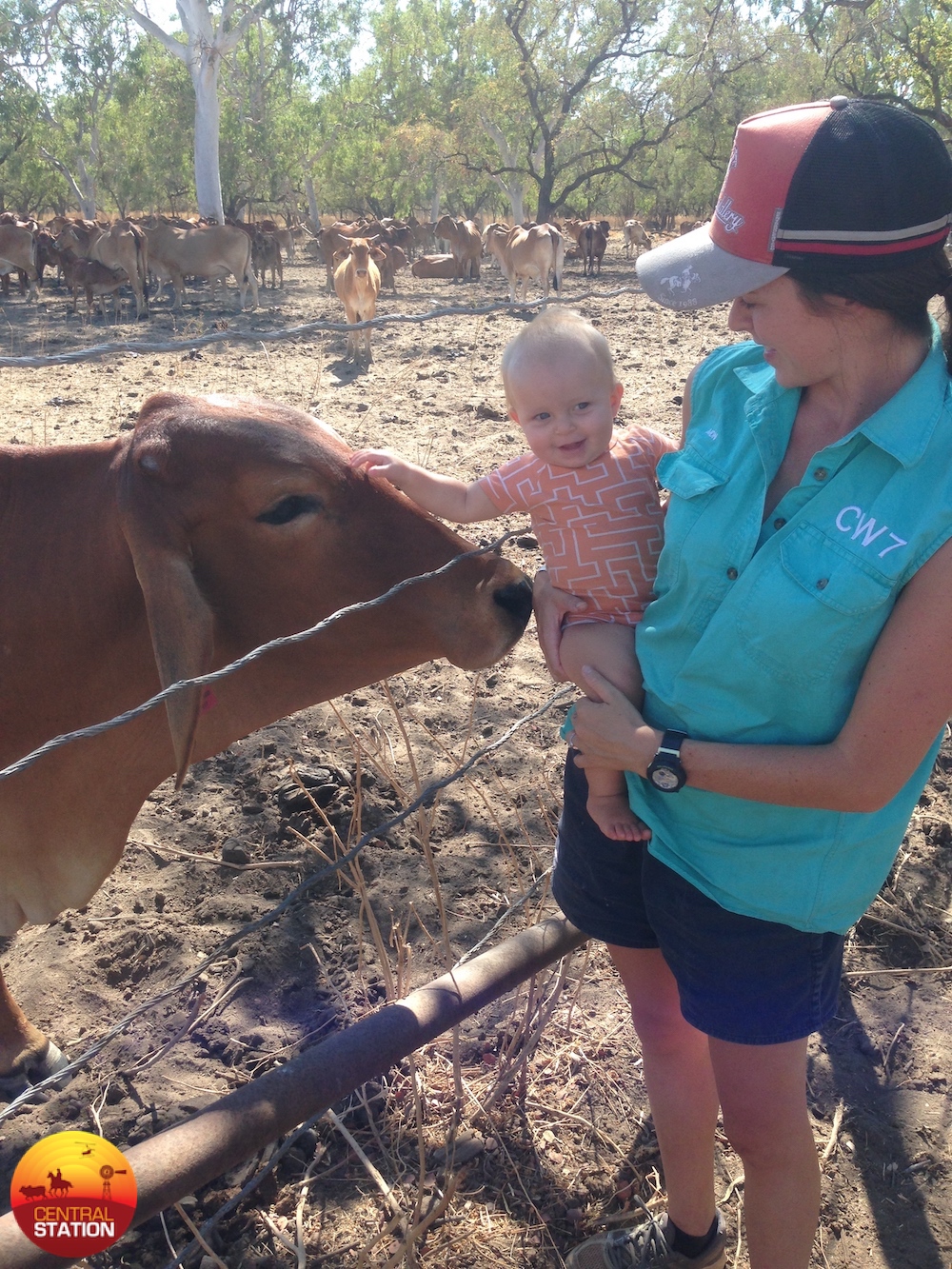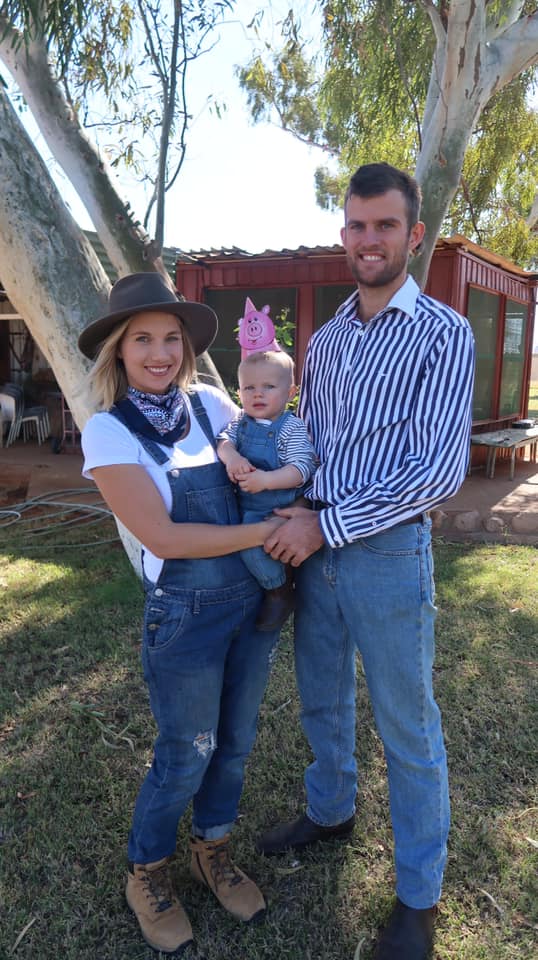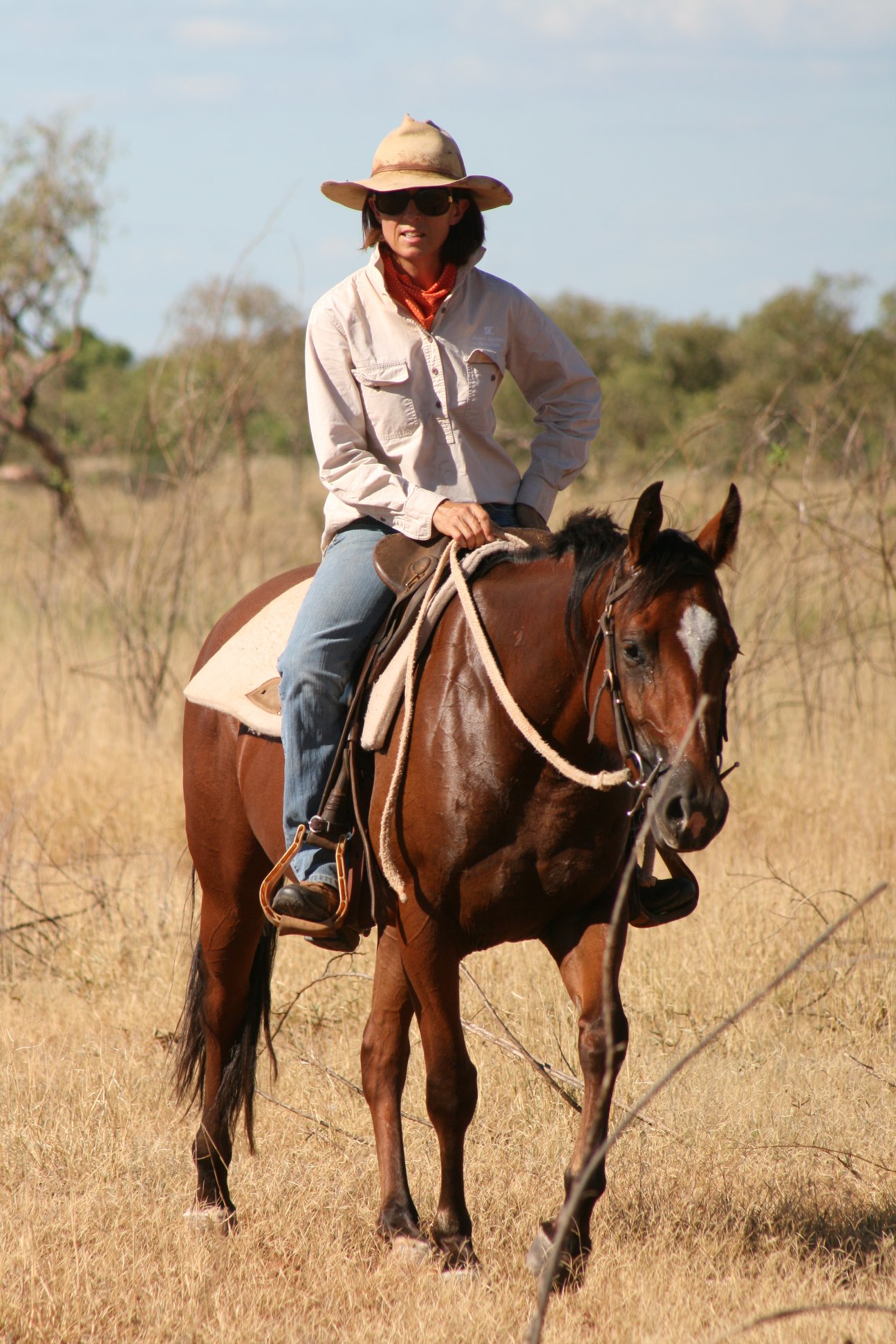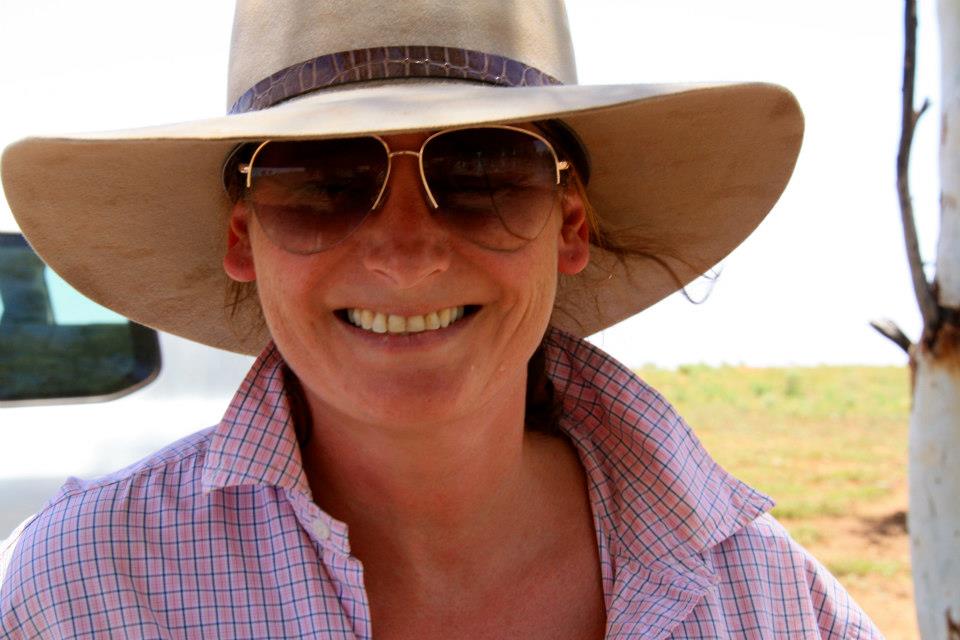The Minister for War and Finance
Written by Steph Coombes, Central Station editor
I had a boss once who had spent a fair part of his career working in the Defence Force and was still heavily involved in the Army Reserves. He’d often mention how he had to go and pick up the Minister for War and Finance or go meet the Minister. As I have a few friends who rub shoulders with politicians, this didn’t sound far-fetched at all to me. However, I did think the boss sounded a bit wanky when he kept going on about meeting the Minister every other week. I also wondered why a Minister would be spending so much time in the Kimberley when parliament sits in Perth…
After about 4 months of thinking that “War and Finance” was a bloody strange portfolio to hold, I realised that the Minister in question was indeed by boss’s wife. According to that boss man, his wife had the power to start or end a war, as well as to control the finances.
While I know my old boss and his wife are indeed partners, and his nickname for her was a term of endearment, I do find it interesting to look at the dynamics in people’s relationships. Some people adhere to traditional gender roles, while others completely buck the trend. I don’t think there is any “right” or “wrong” way to structure a relationship, as long as both parties are in agreeance and partnership.
Thinking about relationships led me to thinking about relationships on stations, particularly between station owners or managers. The phrase “Station Managers Wife” is one that can induce fear and cold sweats among the toughest of jackeroos. If you think people in the bush are tough, you ain’t seen nothing until you meet a “manager’s wife”.
But here’s the thing – the old stereotype of a “station manager’s wife” isn’t what it used to be. These days, wife’s (and partners) play a suite of different roles on stations, just like women in general. Some are managers, some co-managers, there’s manager’s assistants, and there’s those who work outside the station and have no involvement with the running of it. No matter their role, the women on stations are amazing (and not scary … well, not all of them!).
I asked a few of my friends to explain how they fit into their station, to help dismiss this outdated idea of being a “station manager’s wife”.
Helen Campion, Anna Plains Station
The role I play on our station is ever changing and a bit like a revolving door. I have been here for 13 years as a manager working alongside my husband in many roles.
Mostly I work with the cattle and the stock camp whilst the mustering season is on. I also am responsible for making strategic decisions which are for the progress of our station. I am also the buck stop. That means I stand in where I am needed.
There are times when I am the bore runner, cook and the lawn mower lady. I feed poddy calves when the crew go to town on weekends and I also look after my father in law who is blind and still resides on the station. Often, I am the nurse when there is an injury or a diagnosis is required to be made and I provide an ear to the crew if things aren’t going to plan.
I help coordinate and facilitate tasks to be done on a routine basis around the station but most of all I am a mother to two children who are now finished school and attending university and working.
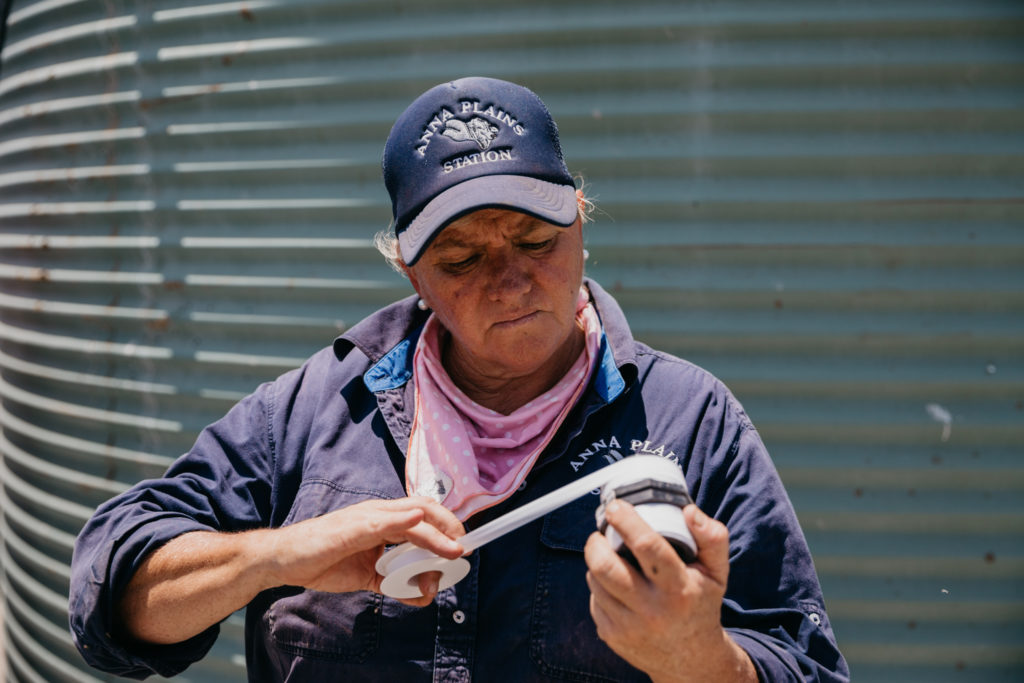
Monica Haslet, Meda Station
Technically my role on the station is ‘just the wife’. I am not employed by the station, though I have been in the past. I am currently a stay at home mum bearing and rearing our children.
With my main priority being raising a small child and it also not being possible due to being in the later months of pregnancy I am no longer spending my days in the stockcamp mustering or doing yard work, but this doesn’t mean I don’t continue to do what I can to help my husband out. Many things of which I am sure are much appreciated and some I imagine go unnoticed.
Not that that bothers me as I know he has other things to think about when he gets home than wondering who sorted out the cold room and tidied up the saddle and feed shed or that the rubbish that the pesky crows have scattered has been picked up.
As most wives probably do, I do the tedious task of the online store order, the drive to town to pick up and then the sorting of it once we get home so everyone gets what they ordered. I run sick or injured staff into town to get to the doctor so they can get back to their healthy selves and back to work and tend to any sick or injured horses so they too can get back to work (and I’m also around in daylight hours to see how their injuries are healing).
I do my best to keep our home clean and tidy with a bit of extra food and cold beer in the fridge so it is a welcoming and homely place for the pilots when they arrive every couple of days to muster. I try and do little things to keep everyone happy when I know they are getting tired such as taking a few boxes of yummy ice creams out to the stock camp while they are camped out, doing a bit of extra baking for the cook to take the pressure off and taking frozen juice cups out to the stock camp to eat while they are blocking up cattle on musters that I know from personal experience can sometimes be very long hot days. So for me although some days I do so incredibly miss being out there doing the hard work I do also absolutely love the role I play on the station as ‘just a wife’ and ‘just a mum’.
Anne Marie Huey, Dampier Downs Station.
As someone who is probably perceived as a typical ‘farmer’s wife’, one thing that really annoys me is when outsiders express surprise that Mike helps me around the house. He doesn’t. Just as I don’t ‘help’ in the cattle yards, or ‘help’ build a fence. Running a successful cattle business really is a team effort and it takes both of us – plus some committed staff – to get through the season.
Of course, we each have our strengths. I fully admit I am mechanically challenged while Mike really doesn’t know one end of a spreadsheet from the other. As a result, the bulk of the (metaphorical) nuts and bolts of the office work tends to fall to me, while the actual nuts and bolts of keeping equipment and machinery running is more Mike’s forte.
With that in mind, I was recently asked to describe the many and varied roles I may fulfil on any given day. So here goes.
As already mentioned, the office is my domain. This is where I do the bookwork, develop financial, herd and property management plans, including creating and updating infrastructure maps. I am responsible for record keeping, data collection and analysis (I do love a good spreadsheet), keeping track of the budget, and developing daily/weekly/monthly activity plans.
I am also a one-woman HR department and conduct all aspects of recruiting and inducting staff, developing training materials and ensuring staff development goals are being met. When necessary, I am the sole member of the IT trouble-shooting department – although if this requires much more than turning something off and on again and praying to the computer gods I will likely be found on the phone to various technical departments.
Cattle work is something I really enjoy and once again I am involved in all aspects of mustering, working the back yards, drafting, data recording, branding, vaccinating, ear tagging and marking etc, trucking, educating weaners, settling cattle newly arrived in the yards and feeding. I am occasionally foster mother to a rag-tag collection of poddy calves and have no problem sharpening up the knives to cut up a killer.
Further afield, I will build fence, fix fence and undertake bore runs. Bore runs are particularly useful as they are an ideal opportunity to assess the quality and quantity of the feed in the paddocks, keep an eye on the condition of the cattle, note where the sale cattle are congregating and if breeders are dropping out of season calves. It is also allows me to identify potential issues such as broken fences, an increased presence of wild dog tracks, ensure solar panels and troughs are clean and serviceable and keep on top of any number of other problems.
General household duties tend to fall to whoever has spent more time at the homestead that day. Chores such as feeding the animals, keeping diesel up to the generator, maintaining the solar batteries, pumping water to the various bores, watering the lawn, mowing the lawn or cleaning the toilet are shared evenly – although in the case of the laundry it usually comes down to whoever runs out of clean underwear first.
On top of this, I have a side-line consulting business that keeps me in touch with my former life as an extension officer. Again, this is a varied role and I offer services such as co-ordinating and presenting workshops, mapping services, pasture assessments and forage budgets, development and delivery of staff training materials, and developing templates for more effective record keeping.
So there you have it. A typical day in the life of a ‘farmer’s wife’. I can honestly say that no two days are ever the same and very few days finish the way they were planned at breakfast. It’s a challenge, but I wouldn’t have it any other way.
Courtney Walker, Limestone Station
I used to teach at a school two hours from the station so I didn’t officially move here until my maternity leave started when I was pregnant with our son George.
It took me a lot longer to adjust to living here than I thought it would. I grew up in the city and had no farming knowledge before I met my partner Cam (I don’t think I’d even heard the term ‘station’).
At the moment, Cam’s mum usually cooks but she’s been away a bit this year. I’ve been cooking while she’s gone but I find it a challenge. Hiring someone to take over the cooking and cleaning is at the top of my to-do-list.
The dynamics of the family business are shifting so we’re still working out where I fit into things. I’m going to start helping with the paperwork and I’ll organise anything I can get my hands on (I’m trying to convince everyone to watch Tidying Up by Marie Kondo on Netflix with me – the prospect of organising the storerooms excites me).
This year I’m keen to get out in the cattle yards and learn about stock handling. I’m a very cautious person and find the cattle intimidating. The thing I’m most looking forward to about ‘station life’ is building a school room and teaching our kids. Poor George already has more educational toys than he can poke a stick at. Regardless of what my role is on the station, I don’t think I’ll ever stop referring to myself as a teacher.
Sally Towne, Gogo Station
I feel as though I have the best of both worlds as we live on Gogo Station where my husband is the manager and I am lucky enough to be able travel in and out of Fitzroy Crossing each day to run our own business in town, Kimberley Country Department Store!
We love the station life, it is an awesome environment to bring our children up in. The kids love helping out on the station, especially in the yards doing cattle work when they are home from boarding school. They also get to learn about running your own business when they come into the shop to help me out. We feel very blessed with the journey our life is taking and would not swap it for anything!
Editors note: Sally was crazy crazy busy when I pestered her to contribute to this blog. The reason I wanted Sally to be a part of it is because she is not employed by the station at all, and does not officially work for the station. When I first met Sal, her and her husband were managing Helen Springs Station, and Sal was a very big part of the running of that station. Since moving to Gogo, Sal has been working full time in their retail store in town. When Sal was telling me about how she isn’t involved in the station at all (well, I mean, “technically”, because I’m sure she still does a ton for it!), I thought it would be an interesting example to include, because most people just assume “the wife” works on the station in some capacity).
Jane Sale, Yougawalla Station
I guess the best way to describe my role is to write about what I’ve been doing this week…
I started the week doing my budget versus actuals on the income and expenses for the previous month on the station. Earlier this week we also had our last muster on Yougawalla for the year (we only do one round) so I was organising the staff, the fodder, the plan for machinery, vehicles and helicopters (alongside my husband Haydn).
We mustered yesterday, and drafted and trucked cattle today. This afternoon I am catching up on work that is involved with my position on the Pastoral Lands Board before we have a teleconference tomorrow, and tonight I’ll be loading trucks again.
I am also heading to town on an 8 hour drive to drop my son back off to fly to boarding school and run errands in town. When I’m in town I’ll hopefully get my laptop up and running so I can process wages for our 3 stations and get everyone paid!
Right now, every night is extreme logistics: logistics of food, staff, vehicles, equipment – not just here on Yougawalla, but on all the stations we run.
Today Haydn went to visit the development work we’re doing on Lake Gregory Station, so we’ve been discussing the work and making plans for that. Oh, and in amongst all of this, I am dictating this paragraph for my fabulous friend Steph to type up for her blog!
Editors note: Again, poor Jane was flat out when I also pestered her to be a part of this blog (not saying that the other ladies weren’t!). I wanted to include Jane in this blog because having known her for so long, and also having worked at Yougawalla, I feel like I know her role quite well, and as with all the ladies in the blog, it’s quite unique. Jane is as much the manager of Yougawalla Pastoral Company as her husband Haydn. Haydn flies one of the choppers for most of the musters, and Jane runs the draft in the yards. They plan development works together, manage their leases and sub-leases together, draw up budgets together… When Haydn is away from the station for whatever reason, Jane is drawing up mustering plans, organising contractors, and managing staff. She is the manager as much as he is.
So there you have it. This is the experiences and stories of just 6 women. Had I had the forward vision, I would have included Annabelle Coppin, who owns Yarrie Station, and her husband Thomas runs the pub in town – that would have been a good example to share!
There’s a lot of stereotypes in this industry, and that of the “station managers wife” is one I think we can leave out, because it doesn’t really exist anymore does it? The role every wife, and husband for that matter, plays on a station is unique, dynamic, and ever evolving, just like relationships.
While we love to put labels on things, and have people filed away into little boxes so we know what to think about them and how to treat them, I put this challenge out to you… next time you meet a “station managers wife”, look at her for the person she is, and not the label she’s been given … you might just be surprised with who you’re hanging out with!

